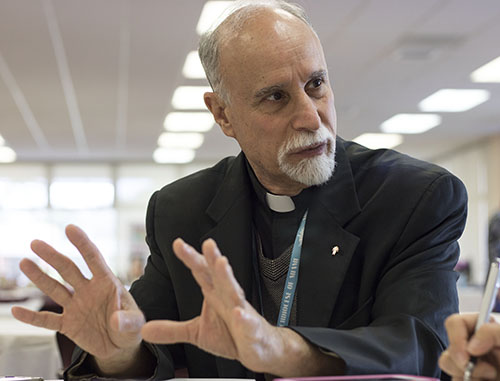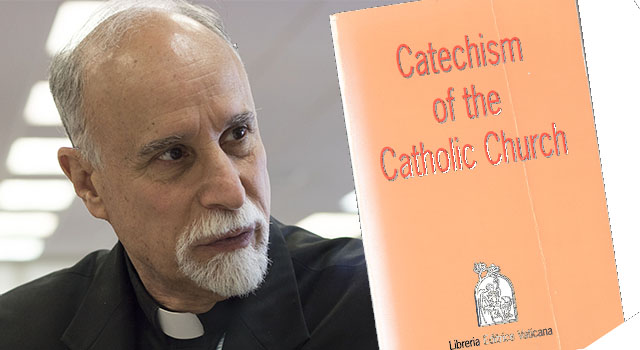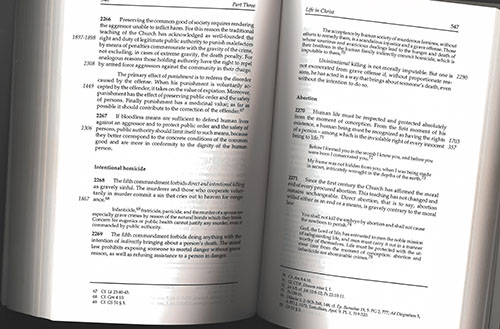By Father Alfred Cioffi -
MIAMI | In its August 2018 edition, the Florida Catholic published questions and answers with Father Alfred Cioffi regarding a change in the wording of the Catechism of the Catholic Church. Father Cioffi recently wrote this article, amending his initial comments about the change in the catechism. Father Cioffi has doctorates in both moral theology and genetics and has been a priest for 33 years. He is the Blue Cross-Blue Shield Endowed Chair of Bioethics in STEM at St. Thomas University in Miami Gardens.
On August 2 of this year, Cardinal Luis Ladaria, prefect of the Vatican’s Congregation for the Doctrine of the Faith, declared that Pope Francis had recently amended the Catechism of the Catholic Church regarding the death penalty. The canon in question is number 2267.
The next day, I was asked by the Florida Catholic newspaper to comment on the matter. In that article, essentially, I defended the long-standing tradition of the Church regarding the application of capital punishment by legitimate civil authority as a means of last resort to protect the civilian population from the possible escape of a convicted dangerous murderer.

Photographer: ISABELLA HAINLIN | FILE
Father Alfred Cioffi, who has doctorates in moral theology and bioethics, is associate professor of biology and bioethics at St. Thomas University, Miami Gardens.
However, in view of Pope Francis’ address to the Pontifical Council for Promoting the New Evangelization on the development of doctrine, I am reversing my opinion and I now stand with our Holy Father that, today, the death penalty is indeed inadmissible, for the following reasons:
First, the doctrine of capital punishment is seen within the context of development of doctrine. Catholic doctrine is indeed dynamic, and allows for legitimate development. Not just a re-phrasing of the same teaching in more contemporary language, but rather a deeper penetration and elucidation of the layers of truth contained within that doctrine.
For example, there has been development of doctrine in the Church’s teaching on marriage. The last encyclical on marriage before the Second Vatican Council was Casti connubii, in 1930, by Pope Pius XI. In it, the Holy Father mentions the begetting of children to be the primary purpose of matrimony: “The primary end of marriage is the procreation and the education of children.”
The first encyclical on marriage after Vatican II was Humanae vitae, by Blessed Pope Paul VI, in 1968. In contrast, the Holy Father stated that: “This particular doctrine [union and procreation], often expounded by the magisterium of the Church, is based on the inseparable connection, established by God, which man on his own initiative may not break, between the unitive significance and the procreative significance which are both inherent to the marriage act.”
So the Church has now come to understand that marriage is not just primarily for begetting children, but rather for the mutual enrichment of spouses and for procreation, up to par with each other. In fact, without this deeper understanding (development of doctrine) childless couples � due to no fault of their own � could be hard-pressed to find meaning to their marriage in God’s eyes.
Second, the development of doctrine as regards the death penalty is a more consistent argument in favor of the intrinsic dignity of all human life. In the words of Pope Francis: “Here we are not in any way contradicting past teaching, for the defense of the dignity of human life from the first moment of conception to natural death has been taught by the Church consistently and authoritatively.”
In the United States, in 1971, Cardinal Humberto Medeiros, then archbishop of Boston, introduced the phrase “consistent ethic of life” to mean precisely to respect and cherish human life at all stages and in all circumstances. In 1983, Cardinal Joseph Bernardin, then archbishop of Chicago, expounded on this theme with what came to be known as the “seamless garment” argument; true prolife advocates also uphold the intrinsic worth of the born, even if they are not innocent in the sense that the unborn are.
Third, as regards legitimate authority having recourse to the death penalty as a last resort to protect civilian population, this must be seen existentially. This is what I mean: Whenever there is life on earth � human and non-human � there is always some risk of premature death. For example: According to the U.S. Department of Transportation, there were over 37,000 fatal car accidents in the U.S. in 2016. According to the National Oceanographic and Atmospheric Administration, there has been an average of about 50 deaths from lightning strike over the past 20 years. Just stepping outside one’s home intuitively represents an increased risk of injury or death.
In view of these facts, how much less risky is life for the average person if all death row inmates were to be executed? To try to ascertain this question, one can make this calculation: According to Amnesty International, there were at least 993 executions worldwide in 2017. According to the United Nations, we were 7.6 billion people in the world last year. If all of last year’s executed death row inmates instead had escaped, that comes to about 0.000,01 percent of the world’s population.
This means that the increased risk of injury or death from an escaped death row inmate today seems to be negligible for the average person on earth. In contrast, according to the World Health Organization, over 15 million people (0.2 percent of the world’s population) died in 2016 due to heart attack or stroke; both pathologies can be more correlated to unhealthy lifestyles than to the attack of an unjust aggressor.
And finally, what is to me the most valuable prolife argument in favor of seeking to abolish the death penalty worldwide is this: It deflates the accusation of pro-abortionists and pro-euthanasia proponents that pro-lifers only care about the unborn. When we pro-lifers rally against capital punishment, we leave pro-choicers perplexed at our extremely high regard for the dignity and sanctity of all human life, including that of those directly involved in the largest genocide in the history of humanity � all because they, unlike us, fail to see and appreciate the humanity of the born and the unborn.
Blessed Cardinal John Henry Newman, an Anglican priest who converted to Catholicism, in his book on the development of doctrine, wrote: “In a higher world it is otherwise, but here below to live is to change, and to be perfect is to have changed often.” In view of the fact that our Lord Jesus Christ calls us to be perfect as our Heavenly Father is perfect (Mt 5:48), I have changed my opinion to agree that, today, the death penalty is inadmissible, and that we should earnestly seek its abolition worldwide.



Comments from readers